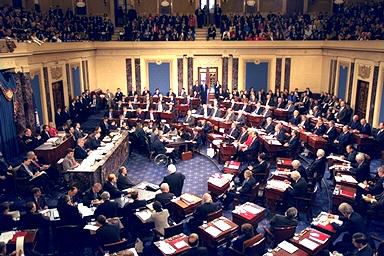Impeachment: a constitutional maneuver with a long history

The impeachment trial of President Bill Clinton in the United States Senate in January 1999.
October 1, 2019
Impeachment is a granted right protected in the Constitution, but it is not one invoked often.
“There are only 17 people who’ve had a majority vote in favor of at least one count of impeachment; only one of those cases actually involved treason,” said Mack Shelley, Iowa State professor and chair of the political science department.
The high crimes and misdemeanors category allows Congress the freedom to convict whatever they find necessary, Shelley said.
Though the founders were initially hesitant about it, the concept of impeachment was ultimately seen as necessary.
When it was first written in the Constitution, it was understood it was not to be taken lightly. Congress needed to know they could not abuse their power, but it was an emergency measure only.
“Treason, bribery or any other high crimes and misdemeanors” are the reasons for impeachment outlined in the Constitution.
The founders were looking out for the country rather than punishing the president for the choices they made.
The process of getting a president impeached is lengthy, but it does depend on the severity of the crime. There have been many presidents who have faced Congress but never actually came close to being impeached, President Richard Nixon being one of them.
Nixon left office after learning Republican members of Congress would no longer be able to support him during his impeachment trial. Rather than facing impeachment, he resigned.
Similarly to the Nixon impeachment case, the urgency of the case of President Donald Trump’s impeachment seems to be relatively slow. However, in Nixon’s case the Democratic control of the House was more numerically overwhelming. If there had been a vote on impeachment before the full House, there could have been multiple impeachment charges passed.
“The thing about Nixon’s situation that’s quite different from now is that the Democrats had solid majority control of both the House and Senate,” Shelley said. “It was politically more feasible for the majority of the House to vote three articles of impeachment.”
Congress does not currently have one dominant party. Both the Democrats and Republicans are represented fairly equally in the House of Representatives after the 2018 election. However, the Democrats do have control of the House. Because of that control, the impeachment case against Trump has recently become feasible.
Speaker Nancy Pelosi opened an official impeachment inquiry against Trump in September.
“The actions taken to date by the president have seriously violated the Constitution, especially when the president says ‘Article II says I can do whatever I want,’” Pelosi said at the time.
This is the third impeachment inquiry in living memory, following Nixon’s and President Bill Clinton’s inquiry and impeachment trial in 1998-99.
“Pelosi had good reason to worry about those seats potentially being lost to the Republicans in 2020 and then the Democrats could lose the majority of the House,” Shelley said.
Trump has said things, tweeted things and done things that are hard to imagine a president doing.
Cases like this one are the exact reason that the Founders never explicitly state what crimes are and are not punishable with impeachment.
“High crimes and misdemeanors to impeach an official means whatever Congress decides it is,” Shelley said. “I think that’s literally true, there is no real guidance in the Constitution.”
“There is plenty of room for interpretation by Congress within the Constitution,” Shelley said.






